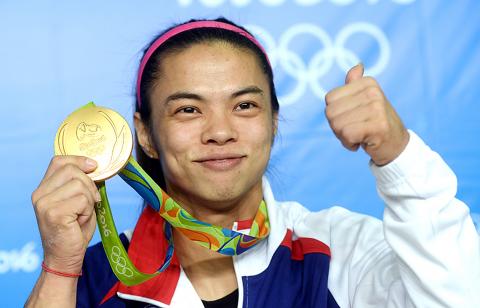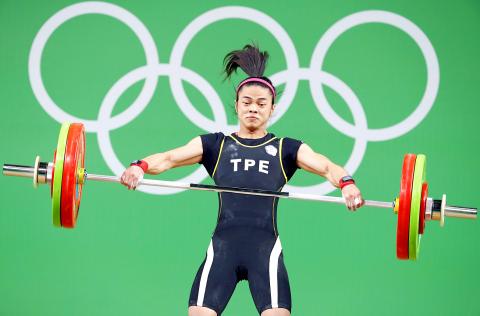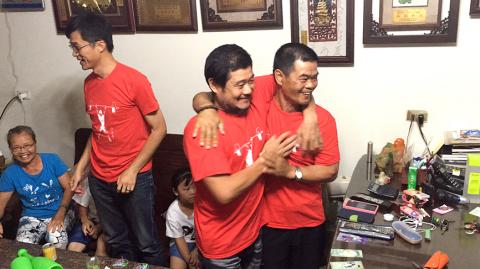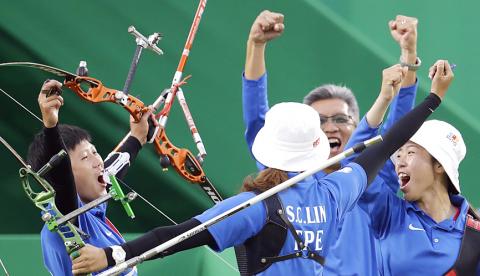Weightlifter Hsu Shu-ching (許淑淨) on Sunday won Taiwan’s first gold medal at the Olympic Games in Rio de Janeiro, lifting a total of 212kg in the women’s 53kg group.
Hsu lifted 100kg in the snatch and 112kg in the clean and jerk.
The 25-year-old student beat the Philippine’s Hidilyn Diaz, who won silver, South Korea’s Yoon Jin-hee, who won bronze, and China’s Li Yajun (黎雅君).

Photo: Lin Cheng-kung, Taipei Times
Hsu could gain another Olympic gold, as she is expected to be promoted from second place in the 2012 London Olympics after the gold medalist — Zulfiya Chinshanlo of Kazakhstan — tested positive for performance-enhancing drugs just before the Rio de Janeiro Games.
Under amended regulations governing the issuance of Guo Guang Athletic Medals and Scholarships (國光體育獎章及獎助學金頒發辦法) and additional prize money offered by the Chinese Taipei Olympic Committee for gold medalists in the Rio Games, Hsu is to be awarded NT$30 million (US$952,018).
The Ministry of Education last year approved amendments raising the prize money for winners of gold medals in the Olympic Games to NT$20 million, with NT$7 million and NT$5 million for silver and bronze medal winners respectively.

Photo: EPA
The committee is to award Hu an additional NT$10 million.
After receiving the medal, Hsu said that her performance was better than she had expected, adding that she was worried about a thigh injury she sustained three weeks ago.
Hsu, who is from a rural area of Lunbei Township (崙背) in Yunlin County, said she plans to donate a portion of her prize money to her alma mater, Kaohsiung Municipal Wunshan Senior High School.

Photo: Huang Shu-li, Taipei Times
In Taipei yesterday, President Tsai Ing-wen (蔡英文) and Premier Lin Chuan (林全) sent congratulatory messages to Hsu.
Tsai thanked Taiwanese athletes at the Rio Games for giving their best, saying Taiwanese are proud of them, Presidential Office spokesman Alex Huang (黃重諺) said.
Hsu’s father, Hsu Yung-ming (許永明), said he was overjoyed by the news.

Photo: AP
Also on Sunday, archers Tan Ya-ting (譚雅婷), Lei Chien-ying (雷千瑩) and Lin Shih-chia (林詩嘉) beat their Italian opponents to take the women’s team bronze medal.
It was Taiwan’s first Olympic archery medal since the men’s team won a silver medal and the women’s team the bronze in the Athens Games in 2004. Tan and Lei are to each receive NT$5 million in prize money.
The Athens Games also saw two of Taiwan’s taekwondo athletes win the nation’s first-ever gold medals: Chen Shih-hsin (陳詩欣) in the women’s under-49kg division and Chu Mu-yen (朱木炎) in men’s under-58kg division.

‘FORM OF PROTEST’: The German Institute Taipei said it was ‘shocked’ to see Nazi symbolism used in connection with political aims as it condemned the incident Sung Chien-liang (宋建樑), who led efforts to recall Democratic Progressive Party (DPP) Legislator Lee Kun-cheng (李坤城), was released on bail of NT$80,000 yesterday amid an outcry over a Nazi armband he wore to questioning the night before. Sung arrived at the New Taipei City District Prosecutors’ Office for questioning in a recall petition forgery case on Tuesday night wearing a red armband bearing a swastika, carrying a copy of Adolf Hitler’s Mein Kampf and giving a Nazi salute. Sung left the building at 1:15am without the armband and apparently covering the book with a coat. This is a serious international scandal and Chinese

PERSONAL DATA: The implicated KMT members allegedly compiled their petitions by copying names from party lists without the consent of the people concerned Judicial authorities searched six locations yesterday and questioned six people, including one elderly Chinese Nationalist Party (KMT) member and five KMT Youth League associates, about alleged signature forgery and fraud relating to their recall efforts against two Democratic Progressive Party (DPP) legislators. After launching a probe into alleged signature forgery and related fraud in the KMT’s recall effort, prosecutors received a number of complaints, including about one petition that had 1,748 signatures of voters whose family members said they had already passed away, and also voters who said they did not approve the use of their name, Taipei Deputy Chief Prosecutor

UNDER ATTACK: Raymond Greene said there were 412 billion malicious threats in the Asia-Pacific region in the first half of 2023, with 55 percent targeting Taiwan Taiwan not only faces military intimidation from China, but is also on the front line of global cybersecurity threats, and it is taking action to counter those attacks, President William Lai (賴清德) said yesterday. Speaking at the opening of this year’s Cybersec Expo in Taipei, the president assured foreign diplomats and exhibitors that Taiwan remained committed to strengthening its defense against cyberattacks and enhancing the resilience of its digital infrastructure. Lai referenced a report from the National Security Bureau (NSB) indicating that the Government Service Network faced an average of 2.4 million intrusion attempts daily last year, more than double the figure

COUNTERINTELLIGENCE TRAINING: The ministry said 87.5 percent of the apprehended Chinese agents were reported by service members they tried to lure into becoming spies Taiwanese organized crime, illegal money lenders, temples and civic groups are complicit in Beijing’s infiltration of the armed forces, the Ministry of National Defense (MND) said in a report yesterday. Retired service members who had been turned to Beijing’s cause mainly relied on those channels to infiltrate the Taiwanese military, according to the report to be submitted to lawmakers ahead of tomorrow’s hearing on Chinese espionage in the military. Chinese intelligence typically used blackmail, Internet-based communications, bribery or debts to loan sharks to leverage active service personnel to do its bidding, it said. China’s main goals are to collect intelligence, and develop a